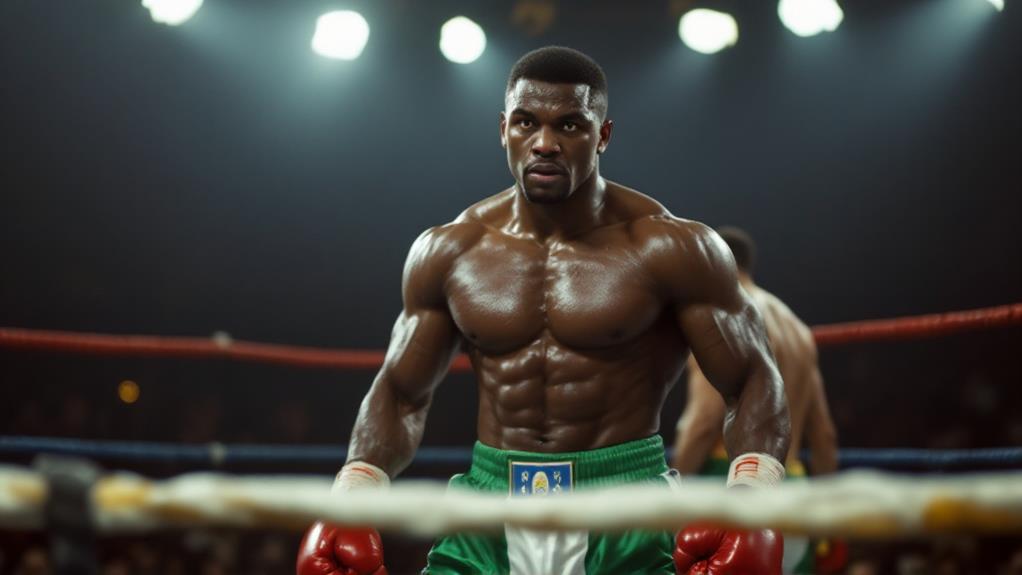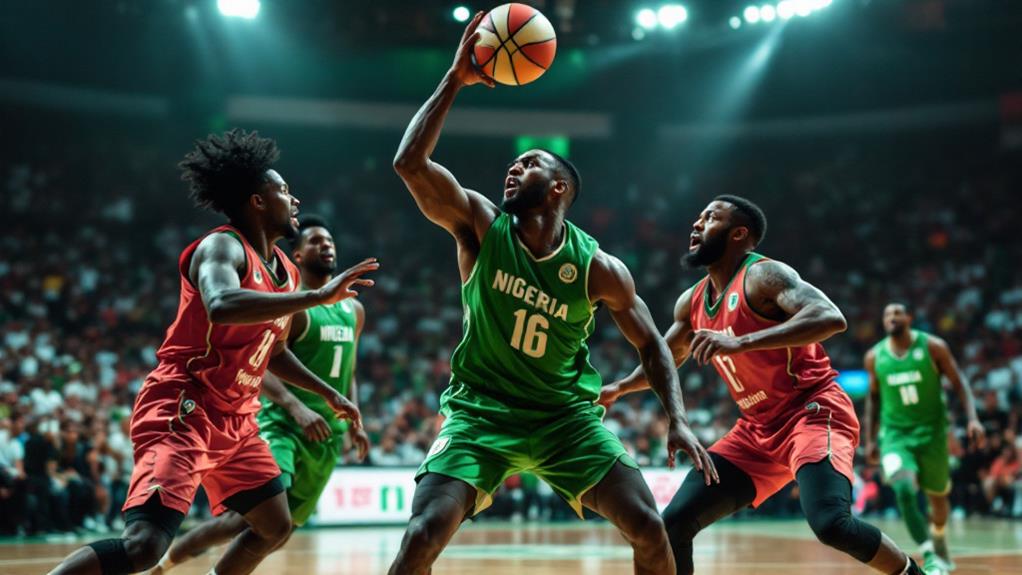Enefiok Udo-Obong: Olympic Champion and Pride of Nigeria
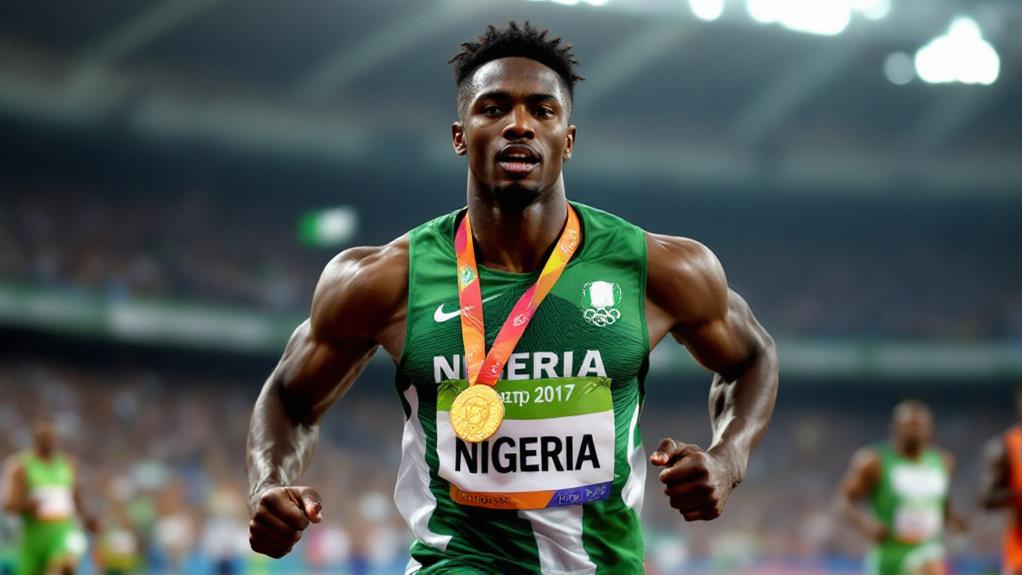
Enefiok Udo-Obong is a Nigerian track and field legend born in 1977 in Akwa Ibom State. He's best known for his Olympic triumphs, winning gold in the 4x400m relay at the 2000 Sydney Olympics and bronze in the same event at the 2004 Athens Games. Udo-Obong's athletic career is marked by record-breaking performances, including setting the Nigerian national record in the 400m sprint. Beyond his personal achievements, he's dedicated himself to mentoring young athletes and promoting sports development in Nigeria. His path from a passionate young runner to an Olympic champion and sports advocate exemplifies the impact of determination and excellence. Explore how Udo-Obong continues to shape Nigerian athletics today.
Early Life and Background
Born in 1977 in Nigeria, Enefiok Udo-Obong's expedition to Olympic renown commenced in the lively state of Akwa Ibom. From a young age, you'd find him developing a passion for sports, particularly track and field. His humble beginnings in this vibrant region laid the foundation for an extraordinary adventure that would make him a national hero.
As you explore Udo-Obong's early life, you'll uncover a young man driven by ambition and a love for athletics. His commitment to education was equally impressive. He pursued a degree in Human Anatomy at the University of Calabar, demonstrating his intellectual prowess alongside his athletic abilities.
But Udo-Obong didn't stop there. Recognizing the importance of sports administration, he furthered his education with an advanced doctoral degree in Sports Administration and Technology from EPFL in Switzerland. This unique combination of athletic talent and administrative knowledge would prove priceless in his future career.
Udo-Obong's early years in Akwa Ibom State shaped him into a well-rounded individual, blending physical prowess with academic excellence. His journey from these modest beginnings to becoming an Olympic champion is a legacy to his determination and Nigeria's sporting potential.
Athletic Career Beginnings
Udo-Obong's athletic expedition began in earnest during his teenage years. As a young Nigerian athlete, he quickly plunged into his passion for track and field, particularly excelling in sprint events. His natural talent and dedication to the sport caught the eye of experienced coaches who recognized his potential.
You'd find Udo-Obong tirelessly training on the tracks, focusing on perfecting his technique and building his endurance. He specialized in the 400-meter sprint, a challenging event that requires both speed and stamina. Under the guidance of his Nigerian coaches, he honed his skills and developed a rigorous training regimen.
Udo-Obong's commitment to his craft extended beyond local training. He participated in international camps, where he gained exposure to diverse training methods and competed against athletes from around the world. This global experience proved priceless in shaping his athletic prowess.
Throughout his early career, Udo-Obong emphasized the importance of discipline. He understood that success in track and field required unwavering dedication and a strong work ethic. This mindset would prove pivotal as he progressed in his athletic odyssey, setting the stage for his future accomplishments on the international stage.
Olympic Triumphs
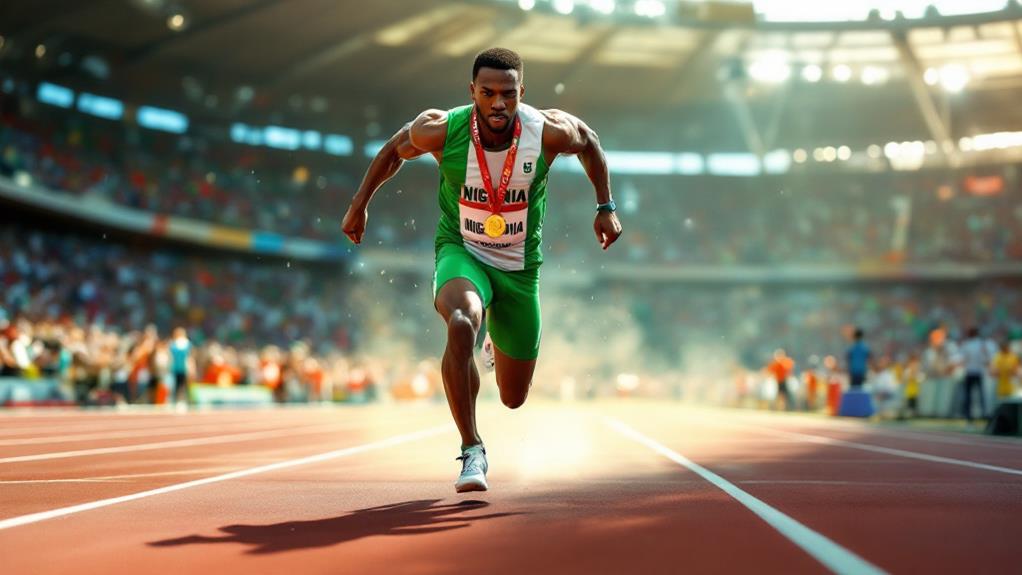
Enefiok Udo-Obong's early dedication and rigorous training laid the groundwork for his Olympic success. His hard work paid off at the 2000 Sydney Olympics, where he achieved his first major Olympic triumph. You'll be impressed to know that Udo-Obong clinched the gold medal in the 4x400m relay, setting a personal best time of 45.5 seconds in the 400m event. This victory wasn't just a personal achievement; it was a moment of glory for all of Nigeria.
But Udo-Obong didn't stop there. He continued to excel on the international stage, securing a bronze medal in the 4x400m relay at the 2004 Athens Olympics. These Olympic triumphs cemented his status as one of Nigeria's top track and field athletes. Throughout his career, Udo-Obong consistently performed at major international competitions, representing his country with distinction. He held the Nigerian national record in the 400m and won multiple gold medals in the event at the African Championships. Udo-Obong's Olympic successes and record-breaking performances not only earned him numerous national awards and honors but also inspired the next generation of Nigerian athletes, making him a true source of national glory.
Record-Breaking Performances
Breaking records became second nature for Enefiok Udo-Obong throughout his illustrious career. You'd be hard-pressed to find a Nigerian athlete who's left a more permanent mark on track and field. In 2001, Udo-Obong shattered the Nigerian national record in the 400 meters, clocking an impressive 45.5 seconds. This feat put him in the same conversation as legendary sprinters like Michael Johnson, showcasing Nigeria's prowess on the global stage.
But Udo-Obong's record-breaking performances weren't limited to individual events. At the 2000 Sydney Olympics, he led the Nigerian 4x400m relay team to a historic gold medal, setting an African record of 2:58.68 in the process. This achievement emphasized Nigeria's place among the world's elite relay teams.
Udo-Obong's dominance extended to continental competitions as well. He consistently shattered records at the African Championships, particularly in the 4x400m relay. His multiple gold medals in this event highlighted his reliability and skill as a relay runner. These accomplishments, along with his Olympic medals and national records, have secured Udo-Obong's legacy as one of Nigeria's greatest athletes. All Rights Reserved.
Awards and Recognition
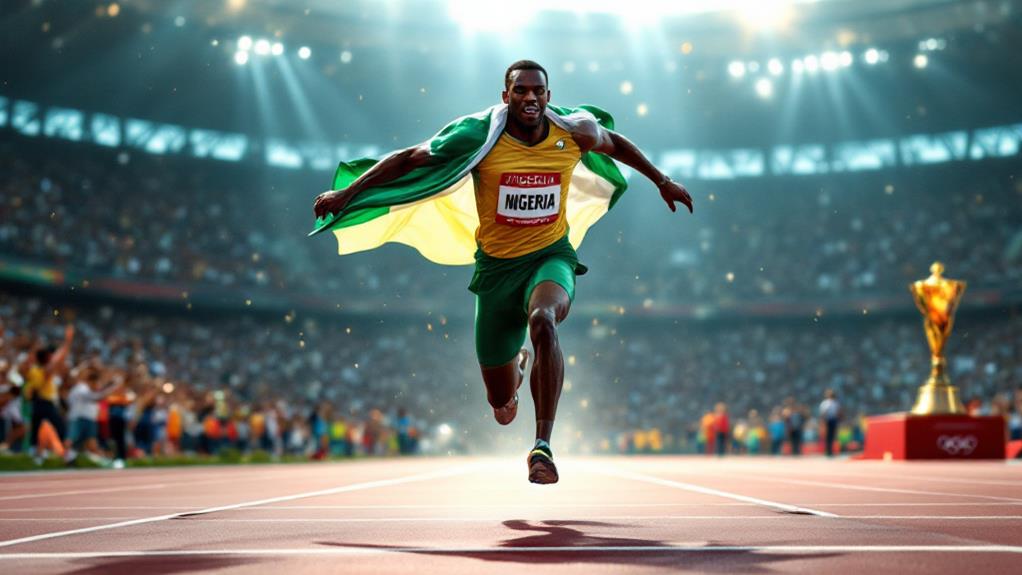
A trophy case bursting at the seams would barely contain Enefiok Udo-Obong's numerous accolades. His athletic prowess earned him prestigious honors both on and off the track. You'll find two Olympic medals among his most prized possessions: a gold from the 2000 Sydney Games and a bronze from Athens in 2004, both in the 4x400m relay.
Udo-Obong's excellence didn't go unnoticed in his home country. He was crowned Nigeria's Sportsman of the Year in 2000, a demonstration of his outstanding performance at the Sydney Olympics. The Dele Udo prize for sporting excellence further solidified his status as a national hero.
His dominance extended beyond international competitions. You'd be impressed by his three national championship titles and six medals from national sports festivals. These achievements showcase his consistency and commitment to excellence.
Udo-Obong's influence reached far beyond the domain of sports. His nominations for prestigious honors, like being named one of the 50 most influential young Africans by African Digest in 2002, brought him international acclaim. This recognition highlighted his impact as both an athlete and a role model for aspiring young Africans.
Training Philosophy
You'd be hard-pressed to find an athlete more dedicated to their craft than Enefiok Udo-Obong. His training philosophy centered on a holistic approach, combining physical, technical, and mental aspects to achieve peak performance.
Under the guidance of experienced Nigerian coaches, Udo-Obong focused on improving his speed, endurance, and technical proficiency through rigorous training regimes. He participated in international training camps, gaining exposure to elite-level coaches and athletes, which broadened his perspective and enhanced his skills.
Udo-Obong's training philosophy emphasized mental resiliency as a crucial component of success. He implemented goal-setting strategies to stay focused and motivated throughout his career. By prioritizing discipline and mental preparation, he maximized his performance potential.
Embracing advanced sports science and technology, Udo-Obong optimized his training and recovery management. His tailored training plans addressed individual strengths, weaknesses, and specific event demands in sprint events. This personalized approach allowed him to fine-tune his performance and achieve optimal results.
Through his comprehensive training philosophy, Udo-Obong transformed himself into a world-class athlete, ultimately becoming an Olympic champion and a source of esteem for Nigeria.
Post-Retirement Contributions

Enefiok Udo-Obong's impact on Nigerian athletics extends far beyond his competitive career. After hanging up his running shoes, he's dedicated himself to shaping the future of track and field in Nigeria.
You'll find Udo-Obong actively mentoring young athletes, passing on his wealth of knowledge and experience to nurture the next generation of Nigerian track stars. He's thrown himself into various sports development initiatives, working tirelessly to promote the growth of athletics across the country. His efforts aim to create opportunities for aspiring athletes and improve the overall standard of Nigerian track and field.
You've likely heard Udo-Obong's voice as a commentator and analyst during track and field events. He uses his proficiency to educate and inspire audiences, bringing a deeper understanding of the sport to viewers. But his advocacy doesn't stop there. Udo-Obong has been a vocal proponent for better sports infrastructure and increased funding to support Nigerian athletes' development.
As a prominent figure in the Nigerian sports community, Udo-Obong continues to be a driving force behind the nation's athletic progress. His post-retirement contributions have solidified his legacy as not just an Olympic champion, but a true ambassador for Nigerian athletics.
Legacy in Nigerian Athletics
Sporting legends often leave enduring marks on their nations, and Enefiok Udo-Obong's legacy in Nigerian athletics is no exception. As one of Nigeria's greatest track and field athletes, his achievements continue to inspire future athletes across the country. His Olympic gold medal in the 4x400m relay at the 2000 Sydney Games remains a source of immense national honor, despite the controversial circumstances surrounding it.
Udo-Obong's impact extends beyond his athletic accomplishments. He's actively involved in sports development initiatives, focusing on mentorship programs and community outreach. Through these efforts, he's working tirelessly to nurture the next generation of Nigerian athletes, passing on his knowledge and experience to help them reach their full potential.
His contributions to Nigerian athletics haven't gone unnoticed. Udo-Obong has received numerous national awards and honors, cementing his status as a true icon of the sport in Nigeria. His national record in the 400m sprint and his role in setting the African record for the 4x400m relay serve as benchmarks for aspiring athletes to endeavor towards. Udo-Obong's legacy continues to shape the future of Nigerian athletics, inspiring young talents to dream big and reach for Olympic glory.
